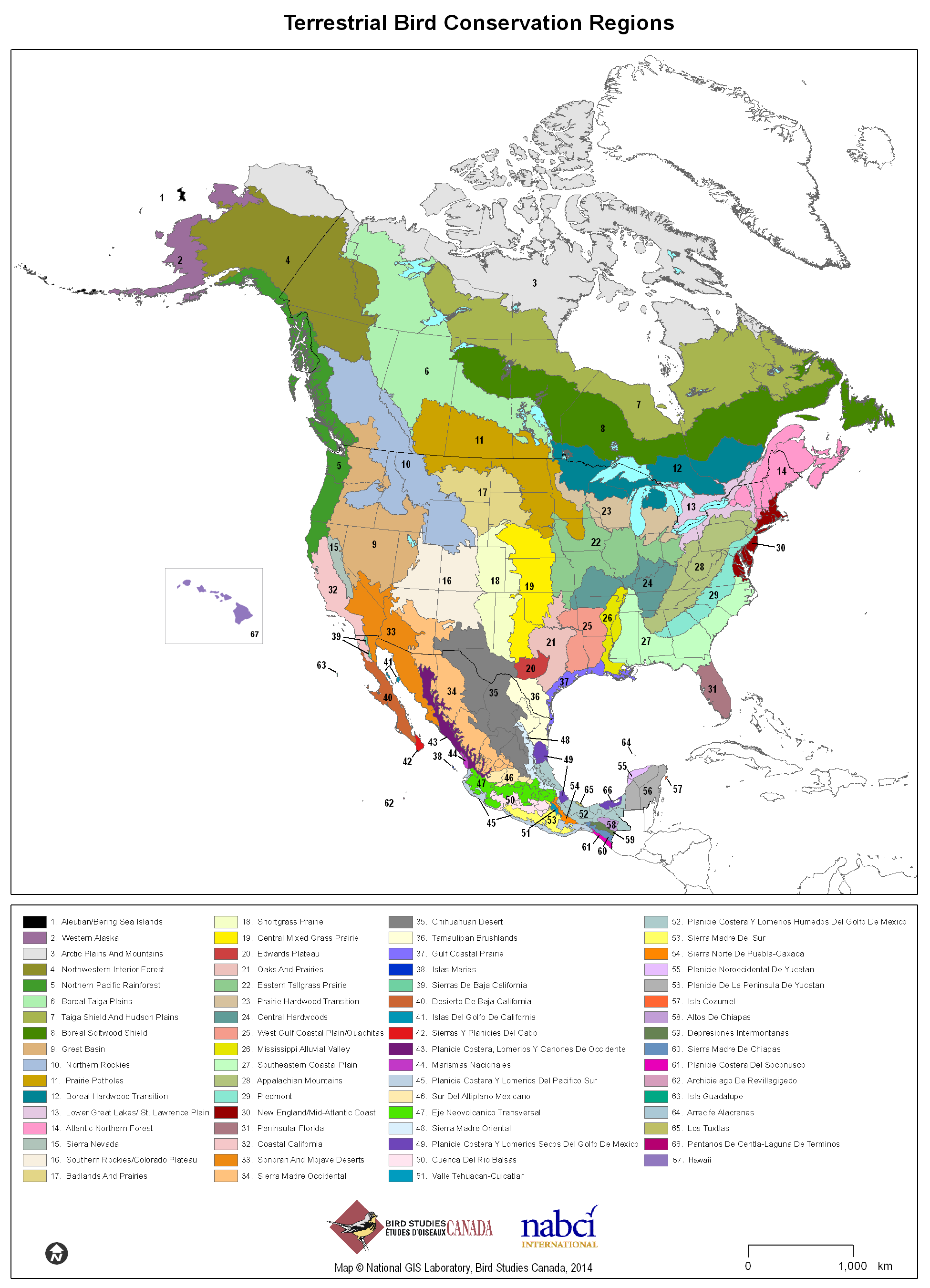The Technical and Evaluation Questions
NAWCA STANDARD GRANT applications ask specific technical questions and it is important to provide complete and detailed answers. Read the proposal instructions carefully and ask our Grants Liaison if you need assistance. Note that the technical questions and scoring table are closely aligned!
Technical Question #1: How does the proposal contribute to the conservation of waterfowl habitat?
You will be asked to list and enumerate waterfowl that your project will benefit: high priority waterfowl, priority waterfowl, and other waterfowl species. These species are listed in the instructions and you can also see them below.
Technical Question #2: How does the proposal contribute to the conservation of other wetland-associated migratory birds?
You will be asked to list the species found in the Bird Conservation Region where the project is located. Not sure what BCR you are in? See the map below.
Technical Question #3: How does the proposal location relate to the geographic priority wetlands described by the North American Waterfowl Management Plan, Partners in Flight, the U.S. Shorebird Conservation Plan, and/or the North American Waterbird Conservation Plan?
You will want to show how your proposal aligns with the conservation priorities of wetlands areas in the four major national bird conservation plans. The instructions link to those four plans. In Part B, you can refer to the priorities of regional plans (such as the Pacific Americas Shorebird Conservation Plan).
Technical Question #4: How does the proposal relate to the national status and trends of wetlands types?
The proposal instructions provide links to the National Wetlands Inventory (NWI) Mapper and suggest contacting your Joint Venture Coordinator for more information at the local level.
Question 5 - How does the proposal contribute to long-term conservation of wetlands and associated habitats?
You will also be asked to consider how changing environmental factors could affect the proposed project acreage or bird populations and if there are adaptations to address those changes.
Technical Question #6: How does the proposal contribute to the conservation of habitat for wetland-associated federally listed or proposed endangered species; wetland associated state-listed species; and other wetland-associated fish and wildlife that are specifically involved with the proposal?
For this questions, be sure to include listed species at both the federal and state level.
Technical Questions #7: How does the proposal satisfy the partnership purpose of the North American Wetlands Conservation Act?
Partnerships and match are key elements for any submitted proposal. It is important to start well ahead of the due date to secure match and non-match partners that will add value to your proposal.
NAWCA SMALL GRANT applications also ask specific questions about birds and habitats, but they are less laborious than the Standard Grants. There are eight major evaluation questions with a three page maximum response. The scoring tables for both the Standard and Small Grant proposals are in the application and are worth careful review.
High Priority Waterfowl Species
..
Steller's Eider
Spectacled Eider
Hawaiian Duck
Laysan Duck
Northern Pintail
Mottled Duck
King Eider
Cinnamon Teal
American Black Duck
Lesser Scaup
Long-tailed Duck
Mallard
Dusky Canada Goose
Atlantic Canada Goose
Mid-continent Lesser Snow Goose
Ross's Goose
Pacific Greater White-fronted Goose
Eastern High Arctic Brant
Emperor Goose
Hawaiian Goose
Eastern Tundra Swan
Interior Trumpeter Swan
Pacific Coast Trumpeter Swan
Medium Priority Waterfowl Species
American Wigeon
Black Scoter
Eastern Barrow's Goldeneye
Western Barrow's Goldeneye
Common Eider
Greater Scaup
White-winged Scoter
Gadwall
Masked Duck
Blue-winged Teal
Green-winged Teal
Surf Scoter
Common Merganser
Red-breasted Merganser
Canvasback
Pacific Brant
Wood Duck
Redhead
Canvasback
Bufflehead
Common Goldeneye
Vancouver Canada Goose
Western Prairie Canada Goose
Cackling Goose
Aleutian Cackling Goose
Midcontinent Cackling Goose
Wrangel Island Lesser Snow Goose
Western Arctic Lesser Snow Goose
Greater Snow Goose
Pacific Brant
Western High Arctic Brant
Atlantic Brant
Western Tundra Swan
Rocky Mountain Trumpeter Swan
Low Priority Waterfowl Species
..
Eastern Harlequin Duck
Western Harlequin Duck
Redhead
Fulvous Whistling Duck
Mexican Duck
Wood Duck
Northern Shoveler
Ring-necked Duck
Black-bellied Whistling Duck
Hooded Merganser
Ruddy Duck
Lesser Canada Goose
Southern Hudson Bay Canada Goose
North Atlantic Canada Goose
Pacific Canada Goose
Rocky Mountain Canada Goose
Atlantic Resident Canada Goose
Mississippi Resident Canada Goose
Hi-Line Canada Goose
Taverner's Cackling Goose

